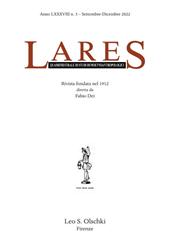Fotografie nella Calabria di inizio Novecento : l'esperienza delle sorelle Palmieri di Dasà
P. 403-430
L'articolo presenta il contributo delle sorelle Concetta e Italia Palmieri nella «nuova arte» della fotografia. Operando insieme al fratello sacerdote Giuseppe sin dall'inizio del Novecento, furono tra le prime donne fotografe in Calabria. Ricostruendo le tappe dell'attività fotografica dei Palmieri, emerge che i tre fratelli furono promotori delle idee più innovative della cultura calabrese del tempo. Proposero una rappresentazione della società coeva, divenendo interpreti della quotidianità e delle istanze di modernità delle comunità di appartenenza. Le due sorelle si cimentarono direttamente con la fotografia, dagli scatti alle pose dei soggetti, dalla cura della scenografia alle tecniche di ritocco, sviluppo e stampa.
Nell'abbondante produzione raffigurarono la comunità in tutte le sue sfaccettature. Misero in evidenza le (scarse) trasformazioni della società di un'area rurale della Calabria del primo Novecento. Riuscirono a cogliere le motivazioni che portavano i vari soggetti davanti all'obbiettivo. Le loro fotografie rappresentano, oggi, la memoria storica condivisa di una comunità. [Testo dell'editore]
This article presents the contribution of the sisters Concetta and Italia Palmieri to the «new art» of photography. They were the first women photographers in Calabria, as since the beginning of the 1900s, they operated with their brother, the priest Giuseppe. Retracing the main stages of Palmieris' photography activity, it emerges that the three siblings promoted the most innovative ideas of the Calabrian culture at that time. They proposed a representation of their society, becoming the interpreters of the daily life and modernity instances of their community. The two sisters were directly involved in the photography process, from the shots to the exposures of subjects, from scenography to the retouching, development and printing techniques.
Their rich production depicted the whole community in all its aspects. They showed the (little) transformations of society in a rural area of Calabria of the Twentieth century and were able to capture the reasons and the emotional boost that led subjects in front of the lens. Their pictures are, today, the historical shared memory of a community. [Publisher's text]
-
Articles from the same issue (available individually)
-
Information
DOI: 10.1400/294690
ISSN: 2036-511X


